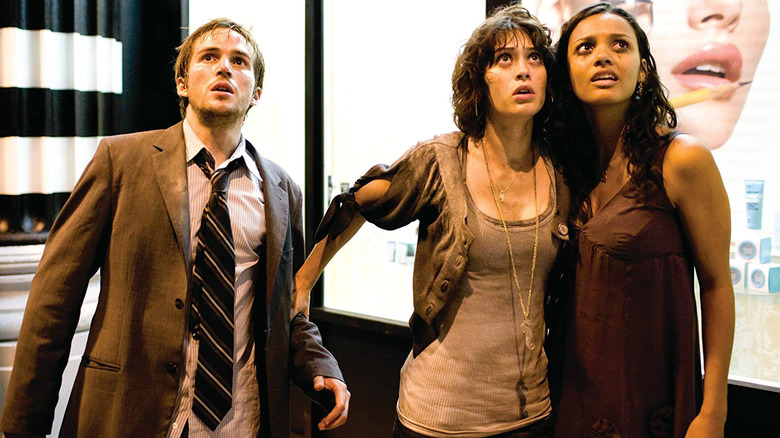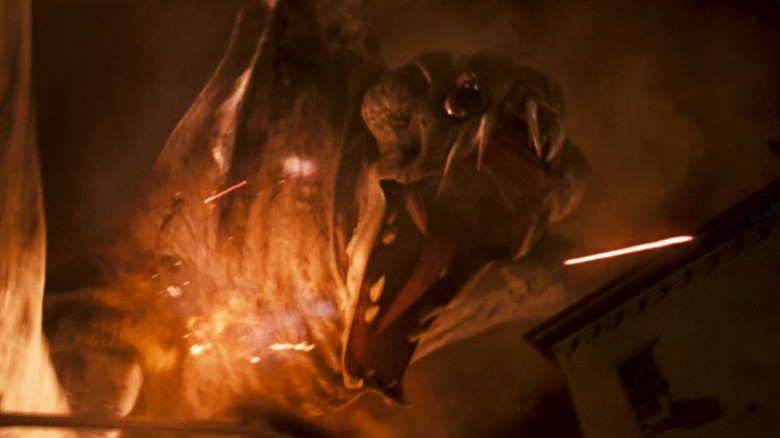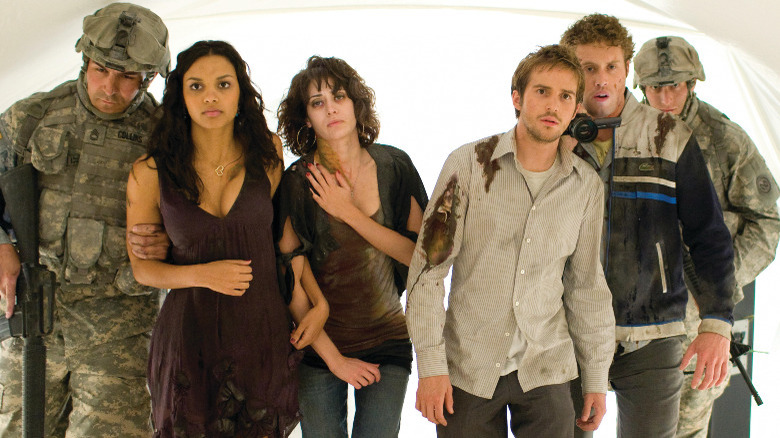The Daily Stream: Cloverfield Captures The Spirit Of A Bygone World In Chaos
(Welcome to The Daily Stream, an ongoing series in which the /Film team shares what they've been watching, why it's worth checking out, and where you can stream it.)
The Movie: "Cloverfield"
Where You Can Stream It: HBO Max
The Pitch: As a director, Matt Reeves thrives at making genre films that serve as allegories for real-world anxieties and chaos. For the sake of this discussion, however, I'm going to ignore his debut on the 1996 rom-com "The Pallbearer" (although it's definitely not lacking for "chaos").
Reeves' 2010 movie "Let Me In" reimagines a Swedish vampire story as a dark parable for Ronald Reagan's America in the 1980s. In the same way, his "Planet of the Apes" films, 2014's "Dawn of the Planet of the Apes" and 2017's "War for the Planet of the Apes," speak to the growing sense of dread that pervaded the second half of Barack Obama's tenure as U.S. president. As for "The Batman," we're still unpacking the ways its tackles the issues of the day in 2022, as well as the ways it undermines its own political commentary by defaulting to regressive superhero movie tropes.
"Cloverfield," Reeves' 2008 found-footage giant monster thriller, is probably the most direct of his films when it comes to capturing the zeitgeist of the era in which it was made. Early on, as the guests at a farewell party for the movie's lead Rob (Michael Stahl-David) scramble to get a better view of the catastrophe unfolding around them in New York City, someone can be heard wondering aloud if it's another terrorist attack. It echoes a similar moment in Steven Spielberg's own post-9/11 sci-fi feature, 2005's "War of the Worlds."
There was a good deal of debate about the film's merits as a September 11th metaphor at the time of its original release. Some critics fairly argued it exploits the horrors of that day without saying much about it, in the hopes of crating a kaiju movie that's as scary for modern Americans as the original "Godzilla" was for Japanese audiences in 1954. But watching it now? It's practically a comfort film.
Why it's essential viewing
Drew Goddard's "Cloverfield" script can't help but feel more cliched after the glut of found-footage movies that drew from the same bag of tropes in the 2010s. The opening scene alone, where Rob films the morning after an intimate night with his would-be girlfriend Beth (Odette Yustman) at her father's apartment, makes me think of the "Annie's Missing Lover" parody sketch from "Community." To be fair, that skit was aimed more at revenge movies like "John Wick," but there's still some clear overlap.
Then there's the awkward presence of T.J. Miller, who would be perfect as Rob's under-achieving "bro" Hud if only, you know, he wasn't T.J. Miller. Luckily, having Hud act as the in-movie cameraman for "Cloverfield" serves the movie well, keeping his on-screen time to a minimum and making it easier to forget who's playing him. Also helping? The way the film plays him against Lizzy Caplan, who's great as ever as Hud's crush Marlena. It's clear we're always meant to sympathize with Marlena when she blows him off or makes fun of him ("Oh, my God. You know who Superman is?"), so as to make the scenes where the pair genuinely connect feel all the earned and deserved.
"Cloverfield" remains a solid time capsule of what life was like as a young 20-something in the late 2000s, and not just because everyone has flip phones, either. The world was on fire back then, too, between the Great Recession and the U.S. invasions of Afghanistan and Iraq — enough so that the wealthier, privileged leads in "Cloverfield" can come across as being more obnoxious than perhaps intended. But that also makes the movie feel authentic and honest in the way it depicts people who are still in their second coming-of-age, only for disaster to come a-knocking and teach them a hard lesson in what it means to be a grown-up.
Remember when that kaiju attacked Manhattan? Ah, simpler times
Once the monster (Clover?) attacks New York and sends the head of the Statue of Liberty flying down the street where Rob, Rob's brother Jason (Mike Vogel), Jason's girlfriend Lily (Jessica Lucas), Hud, and Marlena were partying, "Cloverfield" really hits its stride and never slows down. As relentlessly shaky as the camerawork is by design, there are still glimpses of the visual motifs that would go on to define Matt Reeves' later tentpoles. (My man loves himself some streetlamp lighting and night scenes.) The film even uses its found-footage conceit to justify putting the camera at odd angles, giving rise to all sorts of eye-catching, subjective imagery, some of which feel like a test run for "The Batman" and its superb use of POV shots.
For as intense a thrill ride as "Cloverfield" is, with scenarios that are pure nightmare fuel, there's something almost relaxing about the idea of a world where all you have to worry about is outrunning literal monsters. (On that note: The real champ in the movie is Lily, who braves Manhattan's streets, subways, and fallen buildings in a party dress and heels.) Time and time again, the film reaffirms our faith in humanity. Anyone who can does their best to help Rob rescue Beth from a terrible fate. Clover's rampage does nothing but bring out the best in people, and even those who turn to looting are either sympathetic or, in the case of Rob, doing it for a noble reason. Everything would be great if it wasn't for that dagnabbit kaiju wreaking havoc, right?
It's why "Cloverfield" makes for comfort viewing, 14 years after the hype over its super-duper-secret marketing and the debates about its invocation of 9/11 have dissipated. In 2008, people were more likely to believe that, in times of great duress, we would come together to do the right thing, even if it meant we had to go down fighting. Reeves' film is now a reminder of just how far removed we are from that bygone world, in more ways than just our cellphones.


